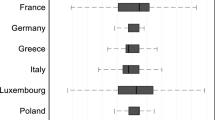Abstract
This chapter examines the effect of women’s participation in household decisions on living standards. In the logic of cooperative theories, the chapter is based on the assumption that the cooperative decision-making process is beneficial for the household’s utility function. Data from the Demographic and Health Survey of Benin, Mali and Togo are used in order to evaluate the impact of women’s bargaining power on household living standards. Results from the study indicate a convergence of the empirical results obtained in these three countries and highlight the beneficial effect of the participation of women in decisions on the standard of living of households. In addition, it appears that variables such as education level, spousal age and place of residence have significant effects on the standard of living of households.
Access this chapter
Tax calculation will be finalised at checkout
Purchases are for personal use only
Similar content being viewed by others
Notes
- 1.
National Institute of Statistics and Economic Analysis (2013).
- 2.
http://www.instat-mali.org/contenu/eq/rana14pas1_eq.pdf visited on November 7, 2017.
- 3.
https://fr.wikipedia.org/wiki/D%C3%A9mographie_du_Togo visited on November 7, 2017.
References
Adekunle, A. K., & Yusuf, H. (2013). Poverty, Women Empowerment and Gender Equity for Poverty Reduction in Adamawa State, Nigeria. ISESCO Journal of Science and Technology, 9(15), 86–89.
Afoakwah, C., Annim, C., & Peprah, J. (2015). Household Savings and Women’s Bargaining Power in Ghana. Journal of Global Economics, 3(2), 139. https://doi.org/10.4172/2375-4389.1000139.
Anwar, B., Shoaib, M., & Javed, S. (2013). Women’s Autonomy and Their Role in Decision Making at Household Level: A Case of Rural Sialkot, Pakistan. World Applied Sciences Journal, 23(1), 129–136. https://doi.org/10.5829/idosi.wasj.2013.23.01.13040.
Ashraf, N., Karlan, D., & Yin, W. (2006). Household Decision Making and Savings Impacts: Further Evidence from a Commitment Savings Product in the Philippines (No. 939).
Becker, G. S. (1981). A Treatise on the Family (19th ed.). Harvard University Press.
Chiappori, P.-A., & Donni, O. (2006). Les modèles non unitaires de comportement du ménage: un survol de la littérature. L’Actualité Économique, 82(1–2), 9–52. https://doi.org/10.7202/013464ar.
Coondoo, D., Majumder, A., Chakrabarti, S., Mitra, S., Chakrabarti, S., & Nath, D. C. (2009). Poverty and Household Decisions—An Exploration of Possible Interdependence.
Dito, B. B. (2011). Essays on Women’s Bargaining Power and Intra-Household Resource Allocation in Addis Ababa.
Duflo, E. (2012). Women Empowerment and Economic Development. Journal of Economic Literature, 50(4), 1051–1079.
Fiala, N., & He, X. (2016). Unitary or Noncooperative Intrahousehold Model? Evidence from Couples in Uganda. The World Bank Economic Review, 1–9. https://doi.org/10.1093/wber/lhw011.
Haddad, L., Hoddinott, J., & Alderman, H. (Eds.). (1997). Intrahousehold Resource Developing Countries. Baltimore, MD: Johns Hopkins University Press.
Harriet, T., Opoku-Asare, N. A., Asare, O., & Anin, E. K. (2014). The Role of Women in Reducing Household Poverty in the Bongo District of the Upper East Region, Ghana. Journal of Arts Humanities, 3(4), 99–110.
Islam, M. S. (2014). Microcredit, Financial Inclusion and Women Empowerment Nexus in Bangladesh. Journal of Asian Development Studies, 3(2), 6–15.
McCarthy, A. S. (2016). His and Her Fertility Preferences: An Experimental Evaluation of Asymmetric Information in Tanzania. Department of Applied Economics.
Morrison, A., Raju, D., & Sinha, N. (2007). Gender Equality, Poverty and Economic Growth (No. 4349).
Nordman, C. J., & Sharma, S. (2016). The Power to Choose Gender Balance of Power and Intra-household Educational Spending in India.
Quisumbing, A. R. (2003). Household Decisions, Gender, and Development a Synthesis of Recent research (Quisumbing). IFPRI.
Rode, A. (2011). Literature Review: Non-Unitary Models of the Household (Theory and Evidence). http://www.econ.ucsb.edu/~pjkuhn/Ec250A/StudentsPapers/RodeNonUnitaryModels.pdf
Samuelson, P. A. (1956). Social Indifference Curves. The Quarterly Journal of Economics, 70(1), 1–22.
Schmidt, E. (2012). The Effect of Women’s Intrahousehold Bargaining Power on Child Health Outcomes in Bangladesh. Colgate University.
Thiombiano, B. G. (2014). Genre et prise de décision au sein du ménage au Burkina Faso. Cahiers Québécois de Démographie, 43, 249–278. https://doi.org/10.7202/1027979ar.
UNDP. (2013). Situation de la femme au Bénin en 2013 (pp. 0–6). UNDP.
UNDP. (2015). Gender Equality in Human Development—Measurement Revisited. UNDP.
Urdinola, D. A., & Wodon, Q. (2010). Income Generation and Intra-Household Decision Making: A Gender Analysis for Nigeria. In Gender Disparities in Africa’s Labor Market. Washington, DC: World Bank.
World Bank. (2001). Engendering Development Through Gender Equality in Rights, Resources, and Voice. Oxford University Press.
Zou, W. (2015). Intrahousehold Productive Inefficiency in Burkina Faso: Can Experimental Inefficiency Measures Explain Differences in Household Income?
Author information
Authors and Affiliations
Editor information
Editors and Affiliations
Rights and permissions
Copyright information
© 2020 The Author(s)
About this chapter
Cite this chapter
Kponou, M.K.C. (2020). Women’s Bargaining Power and Households’ Living Standards in West Africa: Evidence from Benin, Togo and Mali. In: Konte, M., Tirivayi, N. (eds) Women and Sustainable Human Development. Gender, Development and Social Change. Palgrave Macmillan, Cham. https://doi.org/10.1007/978-3-030-14935-2_17
Download citation
DOI: https://doi.org/10.1007/978-3-030-14935-2_17
Published:
Publisher Name: Palgrave Macmillan, Cham
Print ISBN: 978-3-030-14934-5
Online ISBN: 978-3-030-14935-2
eBook Packages: Political Science and International StudiesPolitical Science and International Studies (R0)




